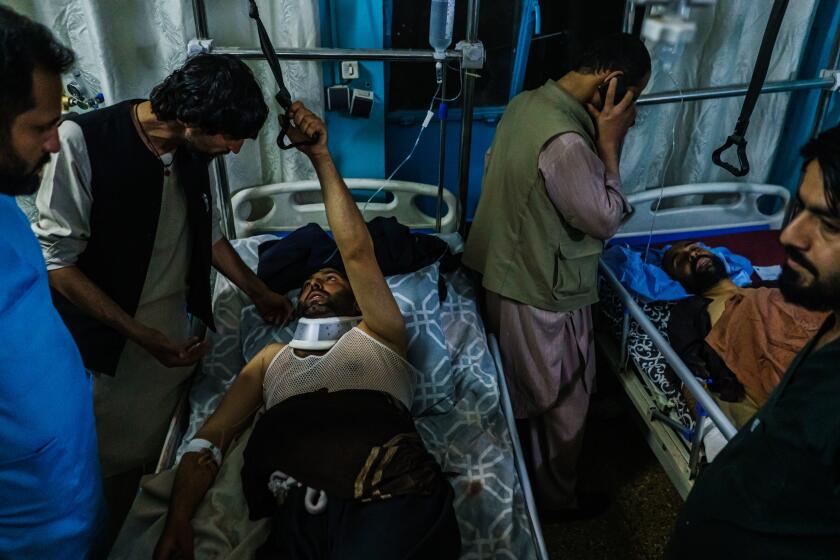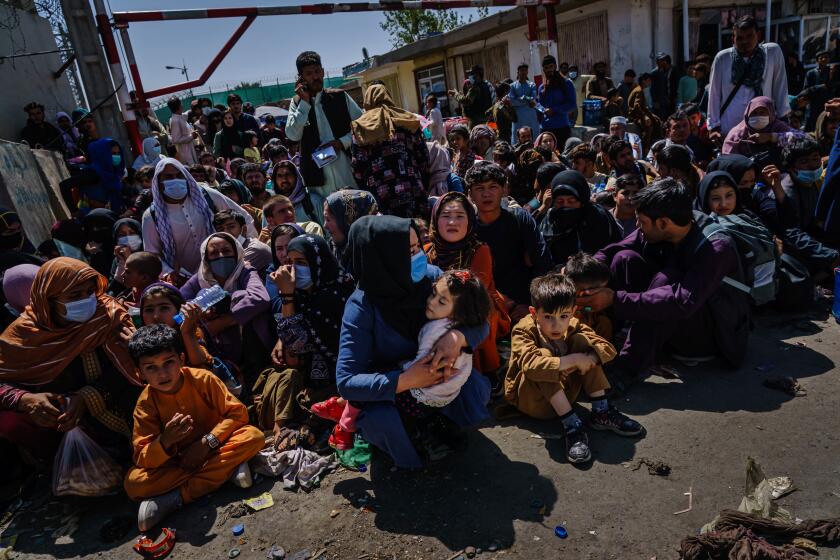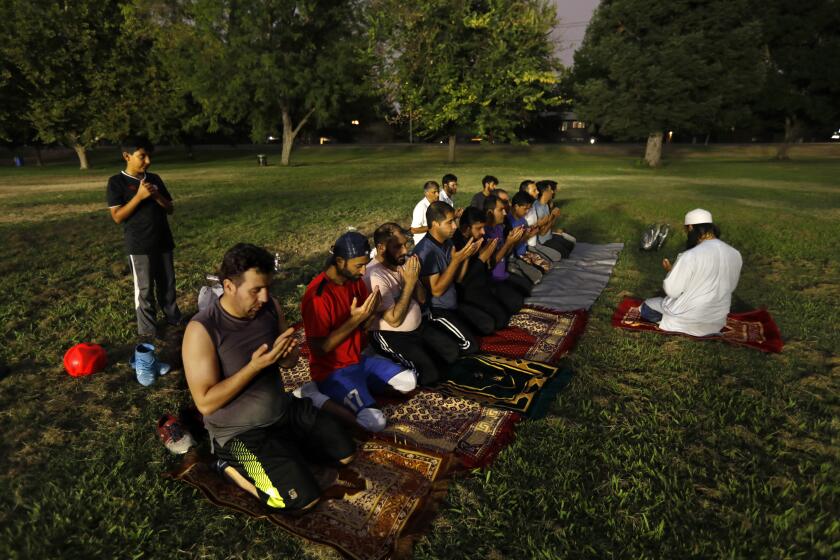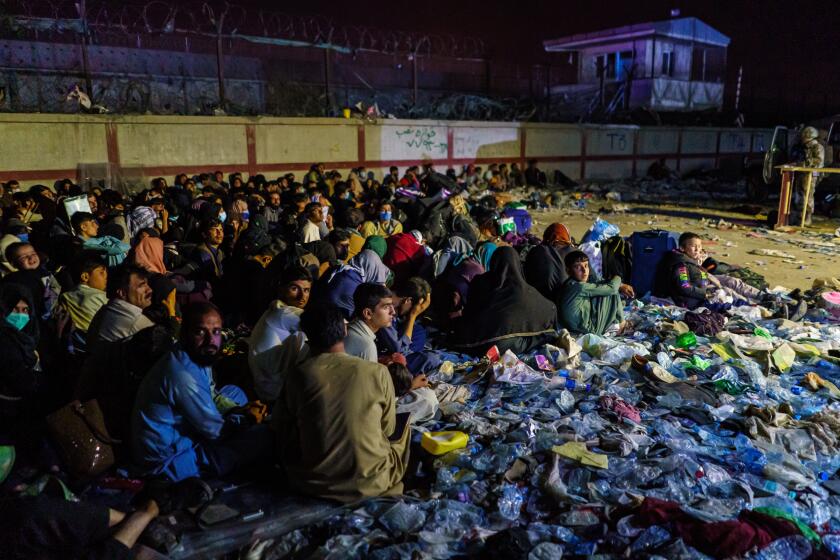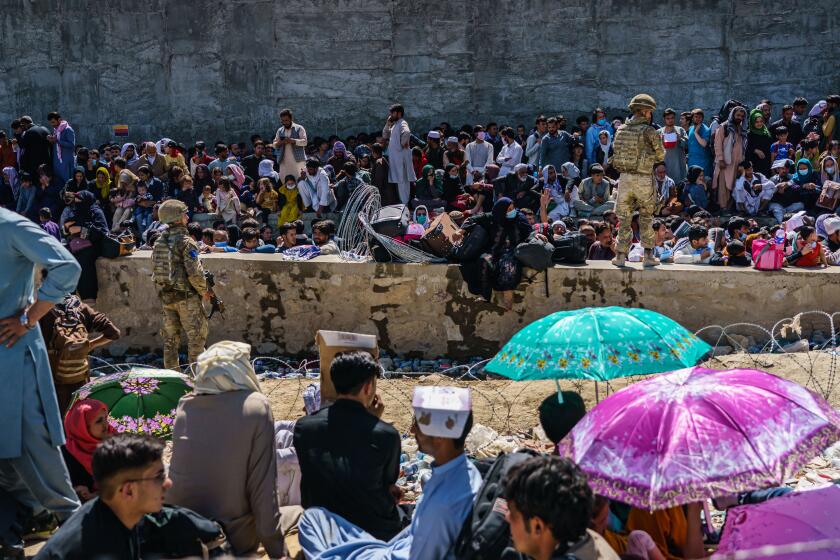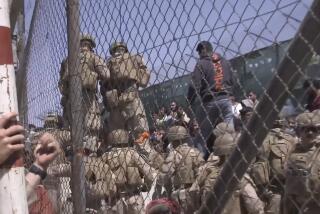‘We’re losing the best’: Afghanistan faces a massive brain drain as its people flee
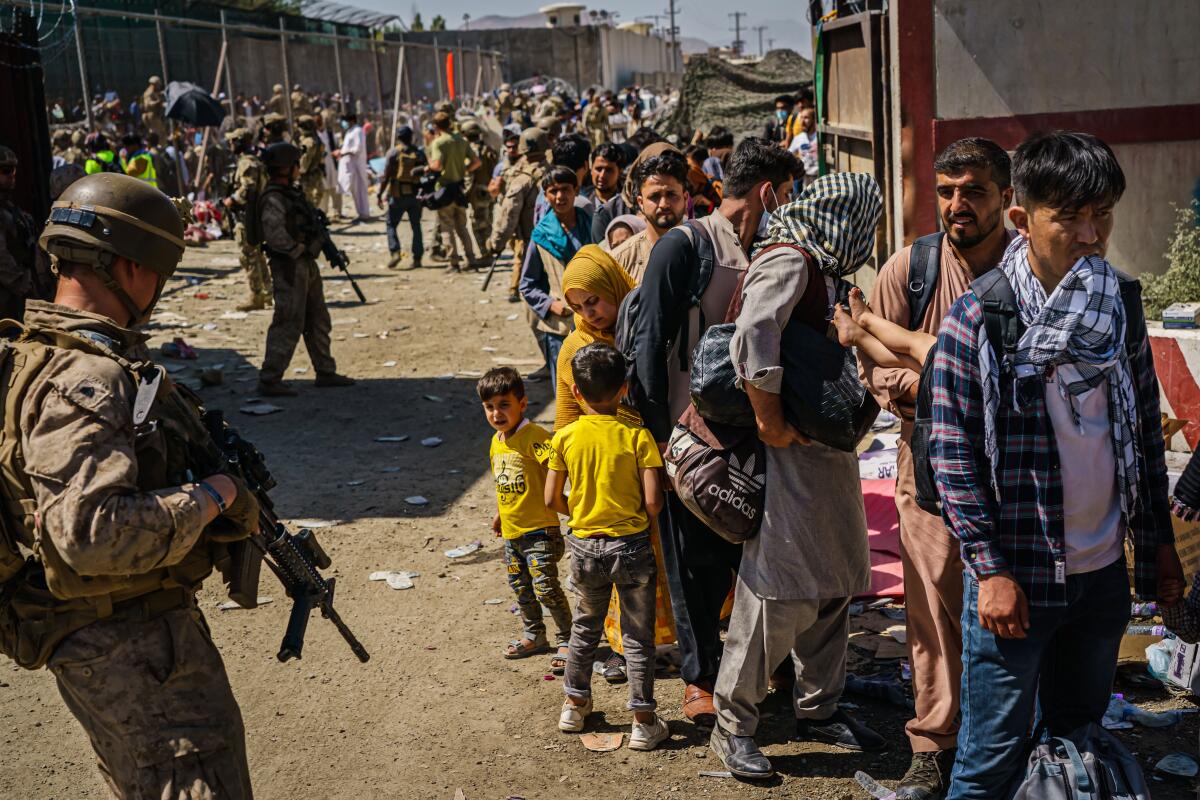
KABUL, Afghanistan — One is a journalist with an international news agency. Another works with a nongovernmental aid organization developing rural communities. A third is an artist who found inspiration at home in Kabul.
None of them wanted to go. Now, all are trying to leave or have already left Afghanistan, joining a brain drain of such grave proportions that even the Taliban, faced with running one of the world’s poorest countries, has taken notice with dismay. The exodus of talent further erases what little gains were made in America’s 20-year experiment in nation building — paid for in blood and billions in cash — at a time when the country’s future is in flux.
“We’re losing the best. The consequences will be huge for the country,” said Alias Wardak, a senior advisor on energy and water to the Afghan Finance Ministry, who has divided his time between Afghanistan and Germany over the last decade working on development projects.
A bombing killed 13 U.S. service personnel and more than 169 Afghans on Thursday outside the airport in Kabul.
Many of his colleagues are still in Afghanistan, Wardak said. Though they want to stay, some are in hiding from the Taliban. Every call he gets is someone crying, devastated over what might come next. He has set up a six-person team of facilitators helping people fill out and submit immigration forms. On Wednesday alone, he fielded 800 requests for assistance.
“If someone calls you and there’s an opportunity [to leave], we’re not in a position to convince them to stay. But on the other hand, what will happen to this country? Who will work in the administration? In the private sector?” Wardak said, speaking from his home in Germany.
“They will go to the West. Their family will be safe and they will have their life. But how many can be evacuated? We still have over 30 million Afghans who have to stay. What is the solution for them?”
Since the Taliban’s rapid-fire takeover of Kabul on Aug. 15, thousands of Afghans, with the group’s brutal rule in the 1990s in mind, have massed at the capital’s airport, cajoling, pleading, fighting and even dying to get onto evacuation flights out of the country. On Thursday, scores of people were killed — including 13 U.S. service personnel — in a bomb attack outside the airport. The Afghan affiliate of Islamic State claimed responsibility for the attack.
Doctors, judges, athletes, activists: Afghan women trapped and considered at-risk under Taliban rule
In Taliban-controlled Afghanistan, women who fear being targeted for their work see dwindling hope of escape.
The U.S. airlift has continued, with more than 100,000 foreigners and their Afghan allies evacuated so far. But tens of thousands of Afghans at potential risk under an Islamic fundamentalist Taliban regime remain, and no one expects they will be spirited to safety before the U.S. and NATO’s scheduled withdrawal Tuesday.
The wealth of skills and expertise that has already fled with those who have gotten out is staggering, said Zulaikha Aziz, co-director of the Afghanistan Project at Berkeley Law School, a pro bono program offering legal support to Afghans inside and outside the country.
“Colleagues who are legal scholars, women’s rights activists who have PhDs in constitutional reform — the real brain hub of Afghanistan,” she said. “These are folks who never had ambitions to come to the U.S. or go to Europe, but now they fear for their lives and their ability to go on with the work to which they’re dedicated.”
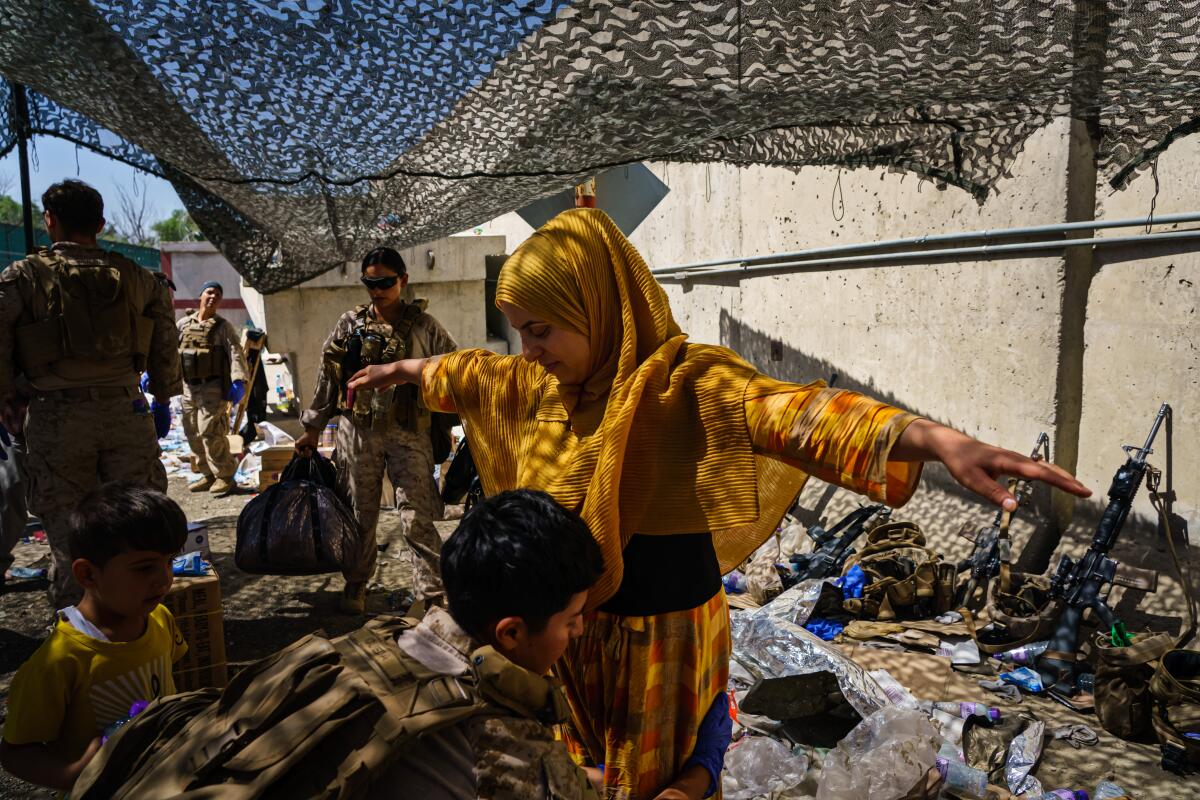
One of them is Rada Akbar, a photographer and visual artist. With the U.S. withdrawal looming, she had been arranging for months for some of her artwork to be sent to France. As the Taliban scythed through city after city at the beginning of August, French diplomats suggested they give her a visa as well. She assumed she would be gone for only a few weeks.
When the Taliban breached Kabul, she rushed to the French Embassy and spent two panic-filled days there as plans to evacuate to the airport by helicopter fell through. It took an escort of French special forces in a convoy of 15 minibuses and more than eight armored cars to get Akbar and others out. As they drove through the streets, Akbar was in shock.
“To see Taliban in Kabul, it was such a violation. They killed so many people in that city. Every corner you just remember there was a bomb blast here, an attack there,” she said. “And now they have everything. It’s us who lost.”
When she landed in Paris a few days later, Akbar burst into tears.
“I was searching for the mountains,” she said, recalling the view of the majestic Hindu Kush that arriving passengers see as they descend to Kabul’s airport.
As the Taliban solidifies control of Afghanistan, Californians with friends and family in the country are scrambling to help.
Still stuck in Kabul on Wednesday was Fuad, a protection advisor to an NGO doing community-level advocacy work. He asked that only his first name be used for safety reasons.
With a backpack on his shoulder and one of his young daughters in tow, he braved crowds, an overflowing sewage canal that turned the street into a fetid river, and AK-47-toting Taliban fighters to reach the airport’s East Gate. An underbrush of discarded clothing and plastic bottles stretched from the cement barrier to a line of concertina wire.
U.S. troops arrayed above the barriers wearily called out, “Go away! Go to Abbey Gate!” to anyone who approached, referring to an alternate entrance that became the scene of major carnage in Thursday’s bombing. When more emphasis was needed, the troops shouted or raised their shotguns.
“We were working to protect civilians from the warring parties,” Fuad said. “Now we are looking for protection. It’s very strange.”
Unlike many around him, he had permission to go and was hoping the Americans had made arrangements to bring him inside. He gave up hours later and went home.
“I won’t try again. Our chance of being killed by the Taliban [here] is less” than at the airport, he said, adding that his employer was looking for other solutions.
“It’s difficult to take the decision to go into the crowd with your 7-month-old kid, but it means there’s a reason why we are leaving. I love my country, but when you don’t have a future there, you have to leave.”
It isn’t the first time Afghanistan has lost some of its best and brightest. Indeed, before the current exodus, more than 40 years of almost uninterrupted warfare turned Afghans into one of the largest refugee populations in the world, with some 2.5 million registered with the United Nations’ refugee agency. The real number is likely to be many times that.
The terrorist group Islamic State in Khorasan, known as ISIS-K, is thought to be responsible for Thursday’s deadly bombing near the airport. Here’s what we know about it.
The Taliban’s first stint in power, from 1996 until its expulsion from Kabul by U.S.-led forces in 2001, was a particularly cruel period. The group, which began as a band of religious students seeking to impose order after a deadly civil war, brought some measure of stability but enforced a strict reading of Islamic jurisprudence. Women were effectively erased from public life, music and sports were banned, and flogging and other corporal punishments were routine.
The Taliban, which is still coming to grips with the astonishingly quick collapse of the Afghan government, insists it has changed. Its leaders say they want people to stay and have issued a blanket amnesty for their former adversaries, claiming to have no interest in vengeance against anyone who worked for the government or its international allies.
An Afghan tradition was all but stamped out by religious extremists who — hearing sin instead of song — outlawed music and threatened with death its practitioners.
Besides, the group’s officials ask, what will these refugees do in their adoptive lands?
“Afghans are being tricked by a false image of the West. These people have degrees. As refugees, they will have to start from the beginning,” one Taliban official said in an interview. He spoke on background because he was not authorized to give a statement.
“They will become taxi drivers,” he said.
Taliban spokesman Zabihullah Mujahid blamed the U.S. for encouraging “Afghan experts” to leave.
“We ask them [Americans] to stop this process,” he said at a news conference Tuesday. “This country needs their expertise. They should not be taken to other countries.”
News Alerts
Get breaking news, investigations, analysis and more signature journalism from the Los Angeles Times in your inbox.
You may occasionally receive promotional content from the Los Angeles Times.
It’s expertise that came at a high price.
“A lot of money was invested in these people — from the international community’s funds, Afghan government funds. They had invested in themselves, so they were a different kind of youth,” said one Afghan journalist with a foreign news agency who left on a flight this week to Qatar and will soon go on to a European country. He did not give his name to protect family members still in Afghanistan.
“The Taliban just knows how to fight,” he said. “It can’t fill this vacuum. It can’t replace them easily.”
You can help Afghan refugees by donating money to or volunteering with organizations in California.
Fuad, whose work often required him to deal with Taliban administrators in rural areas of the country before it came to power, said the group often assigned mullahs — religious leaders — to take over.
“Can a mullah run the national bank? An economist does that. Can a mullah be director of a prison?” he said.
And few Afghans are willing to take the Taliban at its word that it has changed. Many blame the group for a string of assassinations in the last year targeting prominent activists and journalists, believing it to be part of a plan to ensure that it would encounter little resistance when it finally took over the city.
The journalist, who remains in Doha, said he would wait a few months and return if conditions were acceptable.
Twenty-three representatives tell Biden that California is willing to house fleeing Afghan citizens.
“I’ve left behind my loved ones, my home, my everything. If I can do my job and things are fine, I’ll definitely go back and devote myself to covering the country,” he said. “But if I see that I will be threatened, tortured, disrespected, [and] I will not be allowed to cover without bias, then I won’t have any way to make a living. I won’t return.”
Akbar, the artist, who plans to stay in Paris for now, said she will never return as long as the Taliban is in charge.
“They killed my friends, my colleagues. I can’t forgive or accept them,” she said.
“They are not the reality of my country. They stole my land.”
More to Read
Sign up for Essential California
The most important California stories and recommendations in your inbox every morning.
You may occasionally receive promotional content from the Los Angeles Times.
